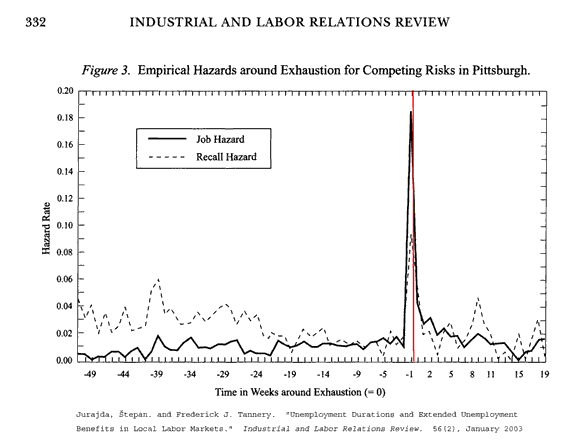“Traditionally, many economists have been leery of prolonged unemployment benefits because they can reduce the incentive to seek work. But that should not be a concern now because jobs remain so scarce, said Lawrence Katz, a labor economist at Harvard.” as quoted by the New York Times. (See also here for the same claim)
What is the basis for this claim? I’m not sure, but Professor Shimer kindly pointed me to an article about unemployment duration in Pittsburgh 1980-85. Unemployment rates got quite high in Pittsburgh in those days, reaching 16 percent at one point, and staying over 10 percent for two and a half years. The chart below shows some of the results. It graphs weeks from unemployment benefit exhaustion against the fraction of unemployment people either finding a new job or being recalled to a previous job in that week. “Exhaustion” refers to the time when benefits cease being paid to the unemployed person, regardless of whether they have found a job.

Almost no one started working during the 2-3 weeks prior to the exhaustion of their unemployment benefits (weeks “-3” and “-2” in the chart). Miraculously, more than one quarter started work a week later (19% started a new job, 10% returned to a previous job). Economists agree that a huge reason for this behavior is that people are more willing to remain unemployed when unemployment itself generates a paycheck. (The job they take may not be great, but the data show that often there is a job to take).
If incentives mattered in Pittsburgh in the early 1980s, why wouldn’t they matter in the United States today? Or why did employment increase almost 1,000,000 last summer?
- Bulenox: Get 45% to 91% OFF ... Use Discount Code: UNO
- Risk Our Money Not Yours | Get 50% to 90% OFF ... Use Discount Code: MMBVBKSM
Disclaimer: This page contains affiliate links. If you choose to make a purchase after clicking a link, we may receive a commission at no additional cost to you. Thank you for your support!



Leave a Reply